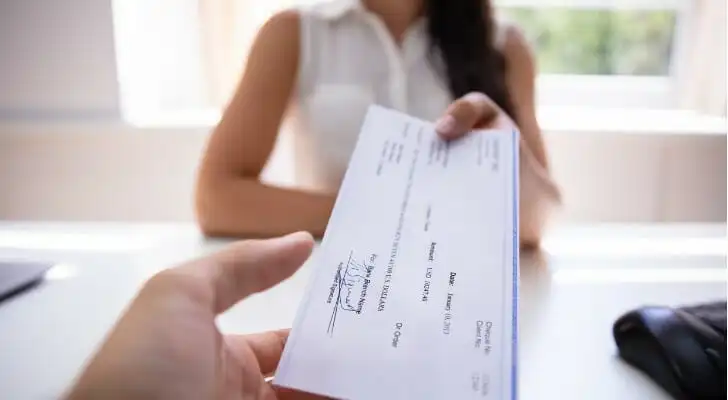A cashier’s check is a type of official check that’s drawn on the bank’s funds, rather than your own. You might obtain a cashier’s check if you need to pay for something and can’t or don’t want to use another payment method. But what happens if you lose a cashier’s check? Are you out of money? A lost cashier’s check can be a headache but there are some steps you can take to recover those funds. If you’re looking for help with all of your financial needs, consider working with a financial advisor who can help you navigate through your unique situations.
How Does a Cashier’s Check Work?
When you write a personal check, the person or entity you write the check out to can then deposit it or cash it. The amount of the check is deducted from your bank account. Cashier’s checks, on the other hand, work a little differently. When you buy a cashier’s check at your bank, the bank deducts the money from your account and uses it to fund the check. But instead of cutting the check from your account, the bank issues the check from its own account.
Using a cashier’s check may be preferable or necessary in situations where substantial amounts of money are changing hands. For example, you might use a cashier’s check to pay if you’re buying a car. Or you might use a cashier’s check to cover the down payment and closing costs on a home that you’re buying.
Cashier’s checks are an attractive form of payment because they’re essentially guaranteed funds. The bank has taken the money from your account to cover the check. As such, the person or entity receiving the check has the reassurance that the cashier’s check won’t bounce.
What Happens to a Lost Cashier’s Check?
A cashier’s check is considered to be lost when you can’t find it. Banks may treat lost cashier’s checks and stolen cashier’s checks differently. If you purchase a cashier’s check and then lose it, there are a few potential remedies. The first thing you can do is report the lost check to the bank and request a stop payment.
A stop payment prevents the check from being cashed. The issuing bank may allow a stop payment on a cashier’s check if you can demonstrate that a lost cashier’s check was in fact stolen or there was some type of fraud involved in the transaction. However, you need to wait 90 days or longer before you can request a stop payment, which could still allow time for someone to cash a lost cashier’s check.
Your bank may ask you to file a declaration of loss for the cashier’s check. Essentially, you’ll have to state that you’ve lost the check and have no hope of recovering it. Filing this declaration allows you to make a claim for the lost funds. But again, you may be subject to a 90-day waiting period before the money can be released back to you.
What if you lose a cashier’s check that someone else gave to you? You sell your car, for instance, and the buyer gives you a cashier’s check to cover the amount, but you misplace it.
In that case, you could try asking the person who gave you the check to replace it. However, they’re not obligated to do so if a lost check is the result of your own actions. If the person who gave you the check is not willing to replace the check for you, the next step is getting an indemnity bond.
What Steps You Should Take After Losing a Cashier’s Check
Losing a cashier’s check can be stressful, especially if it was a large amount or for something time sensitive. Here’s what you should do to resolve the issue:
- Contact the bank right away: Explain to the issuing authority that you’ve lost the check and need to begin the cancellation process. They will be able to help you through what comes next.
- Complete declaration of loss form: The bank will require you to file a declaration of loss form. It’s a basic piece of paperwork that will record the details of the check, such as the amount, payee, and account number, as well as a written statement for you to sign acknowledging the loss.
- Purchase indemnity bond: Because of the risk of fraud, the bank will likely require you to purchase an indemnity bond equal to the amount of the check, but only for a fraction of the cost. The full amount of the bond will be due if your check resurfaces and is cashed at a later date.
- Wait for reissue or refund: Unfortunately, there is no speedy resolution for lost cashier’s checks. Most banks have a waiting period of 30 days or more to reissue a lost cashier’s check. In some cases the bank will refund the money instead.
What Is an Indemnity Bond for a Lost Cashier’s Check?

An indemnity bond is a type of surety bond that creates a binding agreement between two parties. The principal in an indemnity bond is the entity that has a financial responsibility to the second party, known as the obligee.
If you lose a cashier’s check that you purchased or that someone else gave to you, the issuing bank might require you to purchase an indemnity bond in order to replace it. The bond effectively protects the bank against any monetary loss if someone finds the lost cashier’s check and cashes it after they’ve already replaced it for you.
Indemnity bonds are sold through insurance and surety companies. You’ll need to apply to get an indemnity bond and you may be required to agree to a credit check and background check. If approved for the bond, you’ll need to pay a premium which may be anywhere from 1% to 5% of the bond amount in order for it to be issued.
Keep in mind that you may still be waiting some time for a lost cashier’s check to be restored to you even if you go the extra step of obtaining an indemnity bond. It can take anywhere from 30 to 90 days, or in some cases longer, for the bank to replace a lost cashier’s check once the bond has been issued.
Can You Cancel an Unused Cashier’s Check?
It’s possible that you might purchase a cashier’s check only to realize later that you no longer need it. In that case, the check itself is not lost but you might be wondering if the money you used to purchase it is gone for good.
In that case, you could contact the bank to find out what you can do to get the money for the cashier’s check deposited back into your bank account. You may need to return the check to the bank in person before the bank will agree to return the funds.
Keep in mind that the bank may not refund any fees you paid to purchase a cashier’s check. Depending on the bank that may be just a few dollars but at some financial institutions, cashier’s check fees can be $30 or more.
Bottom Line

When dealing with cashier’s checks, it’s important to know when they’re a suitable choice for payment. While cashier’s checks are a safe, secure way to pay they can create unnecessary headaches if you end up losing one. Knowing what to do when a cashier’s check goes missing can help you minimize your financial losses. Your options almost always involve contacting a bank to cancel the cashier’s check. Keep in mind that the bank isn’t likely to refund any fees paid to create the original cashier’s check.
Banking Tips
- Consider talking to your financial advisor about the repercussions of a lost cashier’s check and how to handle large financial transactions. Wire transfers, for example, can be a faster way to move money from your account to someone else’s, though they can sometimes carry high fees. If you don’t have a financial advisor yet, finding one doesn’t have to be difficult. SmartAsset’s free tool matches you with vetted financial advisors who serve your area, and you can have a free introductory call with your advisor matches to decide which one you feel is right for you. If you’re ready to find an advisor who can help you achieve your financial goals, get started now.
- A cashier’s check is not to be confused with a certified check. A certified check is drawn on your funds but is certified by the bank. Similar to cashier’s checks, they can be a secure way to make payments using your funds instead of the bank’s. If you lose a certified check, the process for replacing it mirrors the steps involved to replace a lost cashier’s check.
Photo credit: ©iStock.com/MStudioImages, ©iStock.com/AndreyPopov, ©iStock.com/JuiceBros
